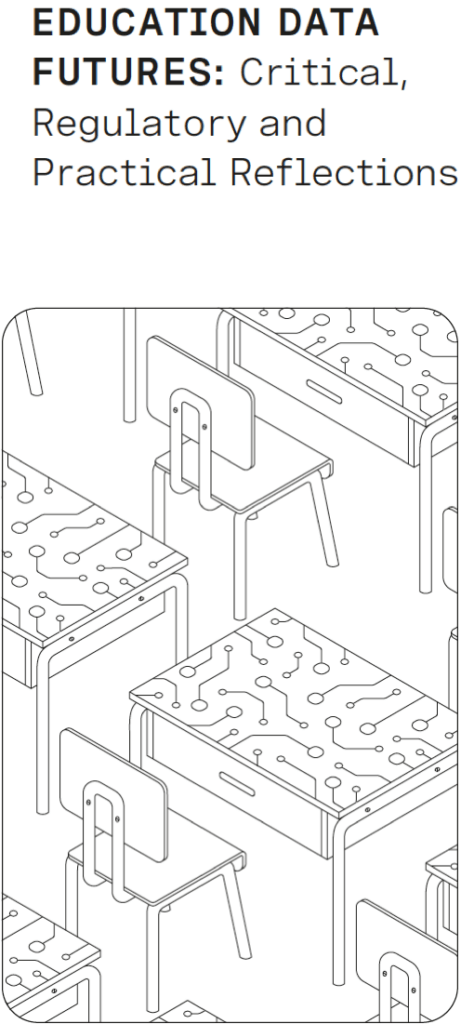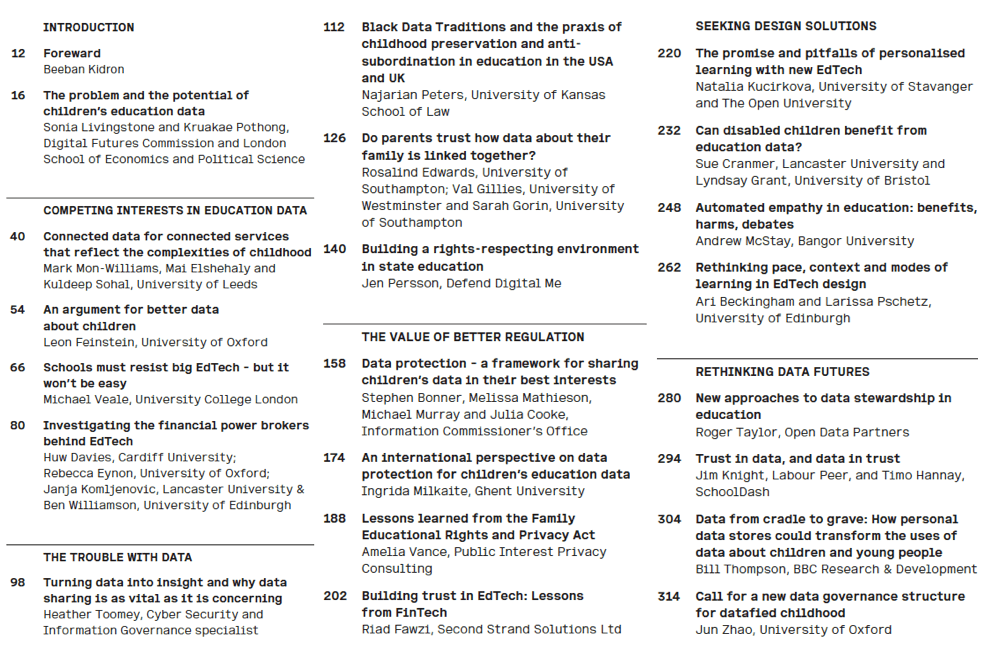By Kruakae Pothong and Sonia Livingstone
The Digital Futures Commission has identified many wrongs with data collection and processing in educational settings in its 2022 Education Data publication series. In parallel, we have been searching for what good should look like when it comes to the uses of education data processed from children in schools.
To mark World Children’s Day, we launch our essay collection on children’s Education Data Futures on the 21st of November 2022 at 3 pm (GMT). This essay collection unpacks answers to four crucial questions:
- What data are collected from children at or through their participation in school, why, and how are they used?
- How can we share data in the public interest, including to support children’s learning or welfare, without undermining their privacy?
- Do uses of education data privilege some children over others, and can we design innovations specifically for those who are disadvantaged?
- Should we better regulate, or differently incentivise, the EdTech market to benefit children’s education without commercially exploiting them?

The collection opens with critical reflections on the competing interests in the increasing ‘datafication’ of education and childhood and its implications of this present arrangement for children, their future and their rights. Our first two essays show how greater data sharing could improve child protection interventions and improve children’s life prospects. Two further essays in this section raise concerns about the ineffectively regulated commercial interests embedded in available EdTech products and services.
Next up are four essays revealing problems with data practices in educational settings. These essays outline poor data practices that encroach upon children’s rights, undermining their prospects and even safety. These bad practices, in turn, undermine the public’s trust – children, parents, caregivers and even schools – in the technologies, insights from the data being processed and the data-driven decisions.
What are the regulatory and design options that could address the thorny question of what ‘good’ data sharing and usage look like? Here, our authors critically reflect on the practicality and effectiveness of these options as possible solutions for child rights-respecting data processing in educational settings. Our essay collection closes on a hopeful promise of a market-led data governance structure – a combination of a business model and technical infrastructure built on trust.
The book is organised into five sections:
- Competing interests in education data
- The trouble with data
- The value of better regulation
- Seeking design solutions
- Rethinking data futures
Within the broad remit of examining the potential for beneficial uses of children’s education data, each contributor was free to define the challenge as they saw fit. Some prioritise academic sources, others practical experience or professional insights. Some take a neutral stance; others are more critical. Together, we believe they make a unique contribution towards a rights-respecting pathway for the uses of education data that benefits everyone. See the contents page below.

Children’s voices introduce each section of the essay collection. As part of our research, we sounded out what children thought of the EdTech they had to use at school – and the data collected about them– via a nationally representative survey of 1,014 schoolchildren aged 7-16. The survey reveals that children have mixed feelings about the EdTech prescribed to them for use in schools.
“Times Tables Rock Stars makes it fun and competitive.” (Girl, 10)
“Anything I need to learn, I can learn from YouTube.” (Boy, 9)
“You are rewarded Dojo points if you do excellent homework or complete tasks to a certain level. I don’t think it helps learning because kids just want the points. However, they don’t retain the information.” (Girl, 13)
“Not great. I don’t find [Hegarty Maths] useful. Videos are too long and confusing.” (Boy, 15)
Sixty-nine per cent of the 6 – 17-year-olds surveyed said it was not acceptable for their schools to share any of the following information about them: address, school grades, behaviour in class, ethnic background, health records and special educational needs.
Our online launch of this essay collection features critical, practical and creative reflections that identify possibilities for beneficial uses of education data while addressing the exploitative uses or misuse of such data from contributing authors – regulators, specialists and academics. Note that we do not position EdTech – or the data it generates – as either good or bad in and of itself. Instead, we emphasise the potential and actuality of how human actions and values shape and are shaped by technological design and systems, business logic, communities of practice and other socioeconomic and political factors. By examining the forces shaping children’s learning lives, we hope to identify the steps needed to better realise their rights in a digital world. In the launch, we will also announce and invite views on our blueprint for change to realise the regulatory and technological promises featured in our collection and previous publications.
This essay collection is available in print and online.
It is not too late to join the launch and contribute your thoughts to our blueprint! Click here to register.